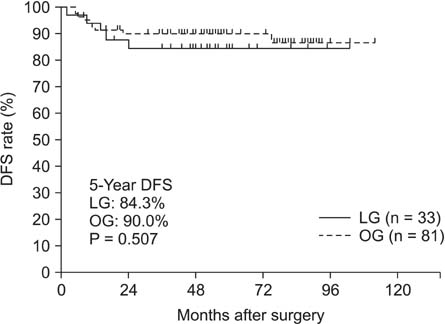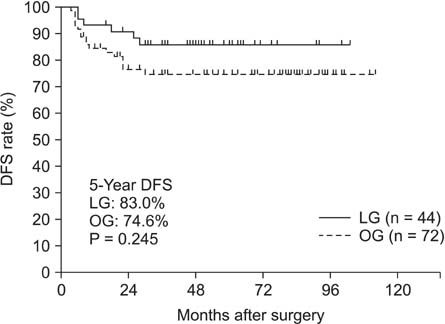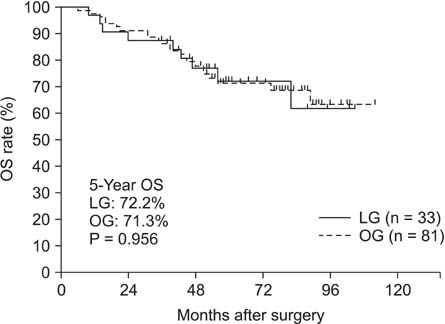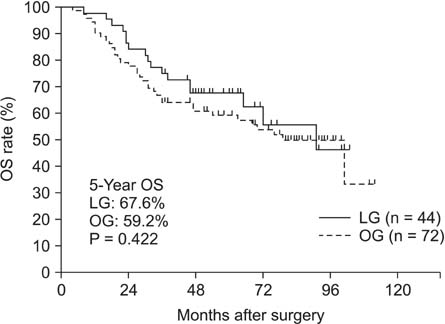Ann Surg Treat Res.
2015 Jan;88(1):8-14. 10.4174/astr.2015.88.1.8.
Comparison of long-term oncologic outcomes of stage III colorectal cancer following laparoscopic versus open surgery
- Affiliations
-
- 1Division of Colon and Rectal Surgery, Department of Surgery, Gachon University Gil Medical Center, Gachon University School of Medicine,Incheon, Korea. gsbaek@gilhospital.com
- KMID: 2167053
- DOI: http://doi.org/10.4174/astr.2015.88.1.8
Abstract
- PURPOSE
The oncologic outcomes after performing laparoscopic surgery (LS) compared to open surgery (OS) are still under debate and a concern when treating patients with colon cancer. The aim of this study was to compare the long-term oncologic outcomes of LS and OS as treatment for stage III colorectal cancer patients.
METHODS
From January 2001 to December 2007, 230 patients with stage III colorectal cancer who had undergone LS or OS in this single center were assessed. Data were analyzed according to intention-to-treat. The primary endpoints were disease-free survival and overall survival.
RESULTS
A total of 230 patients were entered into the study (114 patients had colon cancer-33 underwent LS and 81 underwent OS; 116 patients had rectal cancer-44 underwent LS and 72 underwent OS). The median follow-up periods for the colon and rectal cancer groups were 54 and 53 months, respectively. The overall conversion rate was 12.1% (n = 4) for colon cancer, and 4.5% (n = 2) for rectal cancer. Disease-free 5-year survival of colon cancer was 84.3% and 90% in LS group (LG) and OS group (OG), respectively, and that of rectal cancer was 83% and 74.6%, respectively (P > 0.05). Overall 5-year survival for colon cancer was 72.2% and 71.3% for LG and OG, respectively, and that for rectal cancer was 67.6% and 59.2%, respectively (P > 0.05).
CONCLUSION
The long-term analyses for oncologic aspects of our study may confirm the safety of LS compared to OS in stage III colorectal cancer patients.
MeSH Terms
Figure
Reference
-
1. Clinical Outcomes of Surgical Therapy Study Group. A comparison of laparoscopically assisted and open colectomy for colon cancer. N Engl J Med. 2004; 350:2050–2059.2. Fleshman J, Sargent DJ, Green E, Anvari M, Stryker SJ, Beart RW Jr, et al. Laparoscopic colectomy for cancer is not inferior to open surgery based on 5-year data from the COST Study Group trial. Ann Surg. 2007; 246:655–662.3. Lacy AM, Garcia-Valdecasas JC, Delgado S, Castells A, Taura P, Pique JM, et al. Laparoscopy-assisted colectomy versus open colectomy for treatment of non-metastatic colon cancer: a randomised trial. Lancet. 2002; 359:2224–2229.4. Lacy AM, Delgado S, Castells A, Prins HA, Arroyo V, Ibarzabal A, et al. The long-term results of a randomized clinical trial of laparoscopy-assisted versus open surgery for colon cancer. Ann Surg. 2008; 248:1–7.5. Veldkamp R, Kuhry E, Hop WC, Jeekel J, Kazemier G, Bonjer HJ, et al. Laparoscopic surgery versus open surgery for colon cancer: short-term outcomes of a randomised trial. Lancet Oncol. 2005; 6:477–484.6. Colon Cancer Laparoscopic or Open Resection Study Group. Buunen M, Veldkamp R, Hop WC, Kuhry E, Jeekel J, et al. Survival after laparoscopic surgery versus open surgery for colon cancer: long-term outcome of a randomised clinical trial. Lancet Oncol. 2009; 10:44–52.7. Guillou PJ, Quirke P, Thorpe H, Walker J, Jayne DG, Smith AM, et al. Short-term endpoints of conventional versus laparoscopic-assisted surgery in patients with colorectal cancer (MRC CLASICC trial): multicentre, randomised controlled trial. Lancet. 2005; 365:1718–1726.8. Jayne DG, Guillou PJ, Thorpe H, Quirke P, Copeland J, Smith AM, et al. Randomized trial of laparoscopic-assisted resection of colorectal carcinoma: 3-year results of the UK MRC CLASICC Trial Group. J Clin Oncol. 2007; 25:3061–3068.9. Jayne DG, Thorpe HC, Copeland J, Quirke P, Brown JM, Guillou PJ. Five-year followup of the Medical Research Council CLASICC trial of laparoscopically assisted versus open surgery for colorectal cancer. Br J Surg. 2010; 97:1638–1645.10. Green BL, Marshall HC, Collinson F, Quirke P, Guillou P, Jayne DG, et al. Longterm follow-up of the Medical Research Council CLASICC trial of conventional versus laparoscopically assisted resection in colorectal cancer. Br J Surg. 2013; 100:75–82.11. Leung KL, Kwok SP, Lam SC, Lee JF, Yiu RY, Ng SS, et al. Laparoscopic resection of rectosigmoid carcinoma: prospective randomised trial. Lancet. 2004; 363:1187–1192.12. Braga M, Frasson M, Vignali A, Zuliani W, Capretti G, Di Carlo V. Laparoscopic resection in rectal cancer patients: outcome and cost-benefit analysis. Dis Colon Rectum. 2007; 50:464–471.13. Lee GJ, Lee JN, Oh JH, Baek JH. Mid-term results of laparoscopic surgery and open surgery for radical treatment of colorectal cancer. J Korean Soc Coloproctol. 2008; 24:373–379.14. Laurent C, Leblanc F, Gineste C, Saric J, Rullier E. Laparoscopic approach in surgical treatment of rectal cancer. Br J Surg. 2007; 94:1555–1561.15. Ng KH, Ng DC, Cheung HY, Wong JC, Yau KK, Chung CC, et al. Laparoscopic resection for rectal cancers: lessons learned from 579 cases. Ann Surg. 2009; 249:82–86.16. Staudacher C, Vignali A, Saverio DP, Elena O, Andrea T. Laparoscopic vs. open total mesorectal excision in unselected patients with rectal cancer: impact on early outcome. Dis Colon Rectum. 2007; 50:1324–1331.17. Decker D, Schondorf M, Bidlingmaier F, Hirner A, von Ruecker AA. Surgical stress induces a shift in the type-1/ type-2 T-helper cell balance, suggesting down-regulation of cell-mediated and up-regulation of antibody-mediated immunity commensurate to the trauma. Surgery. 1996; 119:316–325.18. Vittimberga FJ Jr, Foley DP, Meyers WC, Callery MP. Laparoscopic surgery and the systemic immune response. Ann Surg. 1998; 227:326–334.19. Han SA, Lee WY, Park CM, Yun SH, Chun HK. Comparison of immunologic outcomes of laparoscopic vs open approaches in clinical stage III colorectal cancer. Int J Colorectal Dis. 2010; 25:631–638.20. Cole WH. The increase in immunosuppression and its role in the development of malignant lesions. J Surg Oncol. 1985; 30:139–144.21. Da Costa ML, Redmond HP, Finnegan N, Flynn M, Bouchier-Hayes D. Laparotomy and laparoscopy differentially accelerate experimental flank tumour growth. Br J Surg. 1998; 85:1439–1442.22. Martel G, Crawford A, Barkun JS, Boushey RP, Ramsay CR, Fergusson DA. Expert opinion on laparoscopic surgery for colorectal cancer parallels evidence from a cumulative meta-analysis of randomized controlled trials. PLoS One. 2012; 7:e35292.23. Trastulli S, Cirocchi R, Listorti C, Cavaliere D, Avenia N, Gulla N, et al. Laparoscopic vs open resection for rectal cancer: a meta-analysis of randomized clinical trials. Colorectal Dis. 2012; 14:e277–e296.24. Leroy J, Jamali F, Forbes L, Smith M, Rubino F, Mutter D, et al. Laparoscopic total mesorectal excision (TME) for rectal cancer surgery: long-term outcomes. Surg Endosc. 2004; 18:281–289.25. Guerrieri M, Campagnacci R, De Sanctis A, Lezoche G, Massucco P, Summa M, et al. Laparoscopic versus open colectomy for TNM stage III colon cancer: results of a prospective multicenter study in Italy. Surg Today. 2012; 42:1071–1077.
- Full Text Links
- Actions
-
Cited
- CITED
-
- Close
- Share
- Similar articles
-
- Comparison of Long-term Survival for Laparoscopic-assisted Surgery and Open Surgery for Right Colon Cancer: A Case-Control Study
- Current Status of Laparoscopic Surgery for Colorectal Cancer
- Laparoscopic Colectomy : Present and Future
- Laparoscopic Surgery for Rectal Cancer
- Long-term Outcomes of Laparoscopic Surgery for Colorectal Cancer





